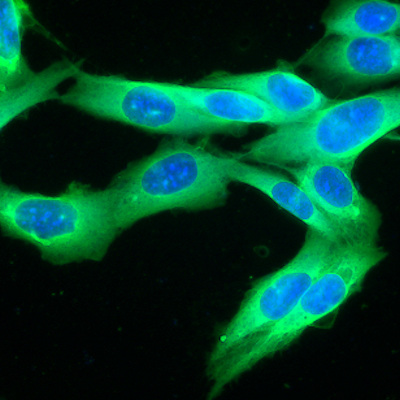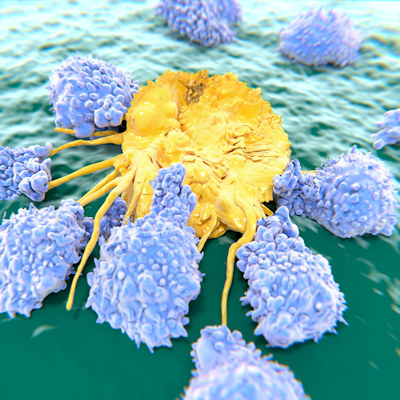May 31, 2023 -- Twin stem cells acting in unison may activate the immune system to suppress metastatic melanoma tumor growth in the brain, according to Department of Defense-funded research, published Wednesday in Science Translational Medicine. The procedure prolonged survival in preclinical trials on mice, indicating that locally delivered immunotherapies may be beneficial in brain metastases treatment.
Overall survival rates for patients with melanoma that has spread to the brain are under six months. In such advanced cancer patients, systemic drugs given intravenously and orally do not effectively target brain metastases.
Immunotherapies, which harness the immune system's power to attack cancer cells, have the potential to improve metastatic melanoma treatment. However, in early clinical immunotherapy studies, the prognosis for most patients remained poor.
Seeking to develop new immunotherapies that could be delivered locally to tumors, the researchers hypothesized that using stem cells to deliver cancer-fighting viruses would amplify the amount of virus released and ensure that the virus would not be degraded by circulating antibodies before impacting the cancer cells.
The team designed a twin stem cell model to maximize the therapy's impact on cancer cells that have spread to a part of the brain called the leptomeninges. One stem cell releases a cancer-killing, or oncolytic, virus -- a strategy previously shown to hold promise in reducing tumor growth. However, oncolytic viruses also destroy the cells that release it, making this an unsustainable therapeutic option on its own.
Therefore, the scientists used CRISPR/Cas9 gene editing to create a second stem cell that would not be targeted by the oncolytic virus. This stem cell releases proteins called immunomodulators that fortify the immune system to help fight off cancer.
The twin stem cells can be delivered via intrathecal injection, a technique currently used in other disease treatments. Unlike some immunotherapies, the stem cells do not require repeated administration.
In preclinical studies, the researchers found that the therapy activated immune responses in mice designed to exhibit a condition that mimics human melanoma with leptomeningeal metastasis. The immune responses in the mice were similar to human immune responses, improving the chances of the therapy succeeding in a phase I trial.
The researchers believe this approach can also be used in other cancers, including lung and breast cancers, which metastasize to the brain. They are currently designing similar treatments for such cancers.
"A number of biological therapies that look promising often fail in phase I or phase II clinical trials, in part because the preclinical models do not authentically replicate clinical settings. We realized that if we did not fix this piece of the puzzle, we would always be playing catch-up," corresponding author Khalid Shah, Harvard Medical School professor, said in a statement. "I don't think we've been at a point in the last 20 years where we have been as close to curing metastases in the brain as we are now."
Disclosures: Khalid Shah owns equity in and is on the board of directors of Amasa Therapeutics, a company developing stem cell-based therapies for cancer. He has filed a patent application entitled "Gene editing and engineering stem cell for drug delivery."
Copyright © 2023 scienceboard.net














